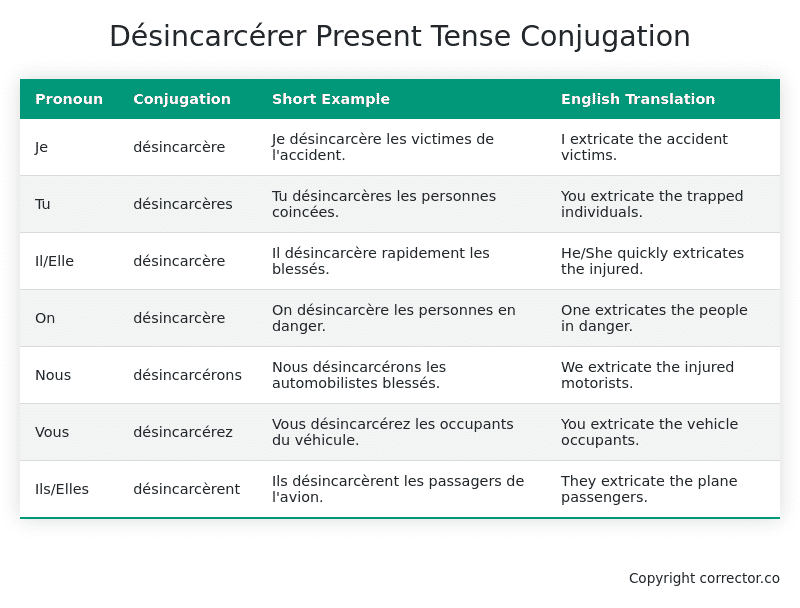Le Present (Present Tense) Conjugation of the French Verb désincarcérer
Introduction to the verb désincarcérer
The English translation of the French verb désincarcérer is “to extricate” or “to release from entrapment”. The pronunciation of the infinitive form, désincarcérer, is dey-zan-kar-sey-rey.
Désincarcérer is derived from the combination of the prefix “dés-” (which indicates a reversal or removal) and the verb “incarcérer” (to incarcerate or imprison). It is most often used in everyday French in the context of emergency situations or rescue operations, referring to the act of freeing someone who is trapped or entangled, typically in a vehicle accident.
Examples:
- Les pompiers ont réussi à désincarcérer le conducteur coincé dans la voiture accidentée. (The firefighters managed to extricate the driver trapped in the crashed car.)
- Les secouristes ont désincarcéré les victimes du tremblement de terre. (The rescuers released the victims of the earthquake from entrapment.)
- Il a été désincarcéré après avoir passé plusieurs heures coincé sous les décombres. (He was released from entrapment after being trapped under the rubble for several hours.)
Désincarcérer – About the French Present Tense
To take a deep dive into all the French tenses then see our article on Mastering French Tense Conjugation.
Common Everyday Usage Patterns For Le Present
Interactions with Other Tenses
Table of the Present Tense Conjugation of désincarcérer
| Pronoun | Conjugation | Short Example | English Translation |
|---|---|---|---|
| Je | désincarcère | Je désincarcère les victimes de l’accident. | I extricate the accident victims. |
| Tu | désincarcères | Tu désincarcères les personnes coincées. | You extricate the trapped individuals. |
| Il/Elle | désincarcère | Il désincarcère rapidement les blessés. | He/She quickly extricates the injured. |
| On | désincarcère | On désincarcère les personnes en danger. | One extricates the people in danger. |
| Nous | désincarcérons | Nous désincarcérons les automobilistes blessés. | We extricate the injured motorists. |
| Vous | désincarcérez | Vous désincarcérez les occupants du véhicule. | You extricate the vehicle occupants. |
| Ils/Elles | désincarcèrent | Ils désincarcèrent les passagers de l’avion. | They extricate the plane passengers. |
Other Conjugations for Désincarcérer.
Le Present (Present Tense) Conjugation of the French Verb désincarcérer (You’re reading it right now!)
Imparfait (Imperfect) Tense Conjugation of the French Verb désincarcérer
Passé Simple (Simple Past) Tense Conjugation of the French Verb désincarcérer
Passé Composé (Present Perfect) Tense Conjugation of the French Verb désincarcérer
Futur Simple (Simple Future) Tense Conjugation of the French Verb désincarcérer
Futur Proche (Near Future) Tense Conjugation of the French Verb désincarcérer
Plus-que-parfait (Pluperfect) Tense Conjugation of the French Verb désincarcérer
Passé Antérieur (Past Anterior) Tense Conjugation of the French Verb désincarcérer
Futur Antérieur (Future Anterior) Tense Conjugation of the French Verb désincarcérer
Subjonctif Présent (Subjunctive Present) Tense Conjugation of the French Verb désincarcérer
Subjonctif Passé (Subjunctive Past) Tense Conjugation of the French Verb désincarcérer
Subjonctif Imparfait (Subjunctive Imperfect) Tense Conjugation of the French Verb désincarcérer
Conditionnel Présent (Conditional Present) Tense Conjugation of the French Verb désincarcérer
Conditionnel Passé (Conditional Past) Tense Conjugation of the French Verb désincarcérer
Conditionnel Passé II (Conditional Past II) Tense Conjugation of the French Verb désincarcérer
L’impératif Présent (Imperative Present) Tense Conjugation of the French Verb désincarcérer
L’impératif Passé (Imperative Past) Tense Conjugation of the French Verb désincarcérer
L’infinitif Présent (Infinitive Present) Tense Conjugation of the French Verb désincarcérer
L’infinitif Passé (Infinitive Past) Tense Conjugation of the French Verb désincarcérer
Le Participe Présent (Present Participle) Tense Conjugation of the French Verb désincarcérer
Le Participe Passé (Past Participle) Tense Conjugation of the French Verb désincarcérer
Struggling with French verbs or the language in general? Why not use our free French Grammar Checker – no registration required!
Get a FREE Download Study Sheet of this Conjugation 🔥
Simply right click the image below, click “save image” and get your free reference for the désincarcérer present tense conjugation!

I hope you enjoyed this article on the verb désincarcérer. Still in a learning mood? Check out another TOTALLY random French verb present conjugation!


